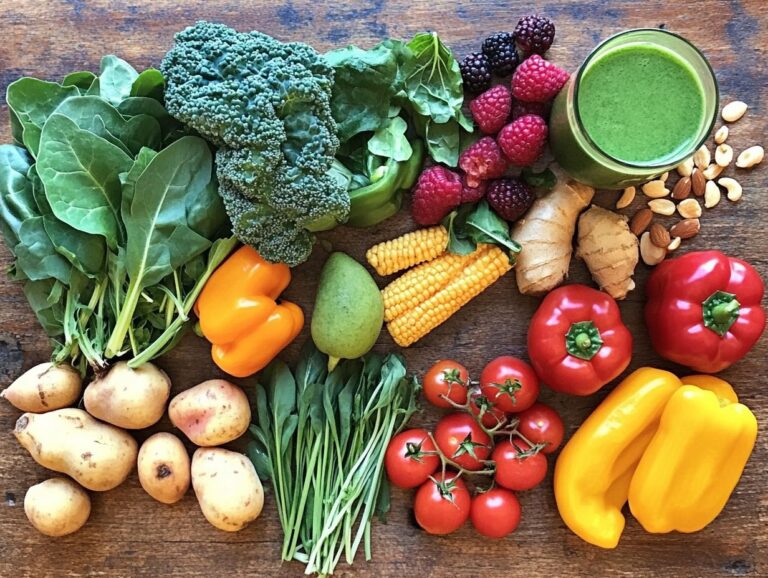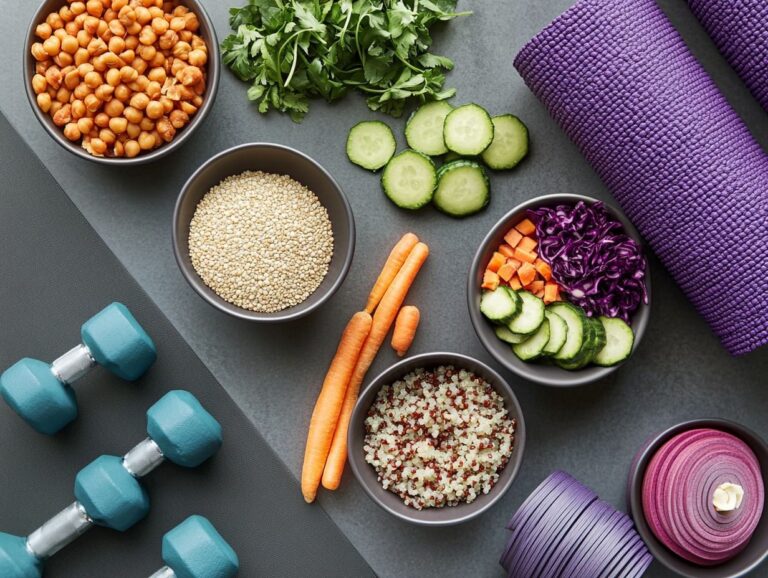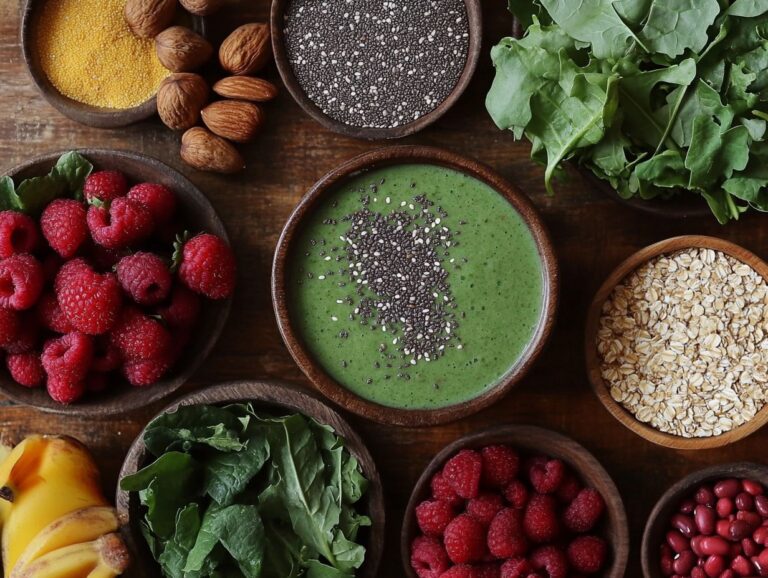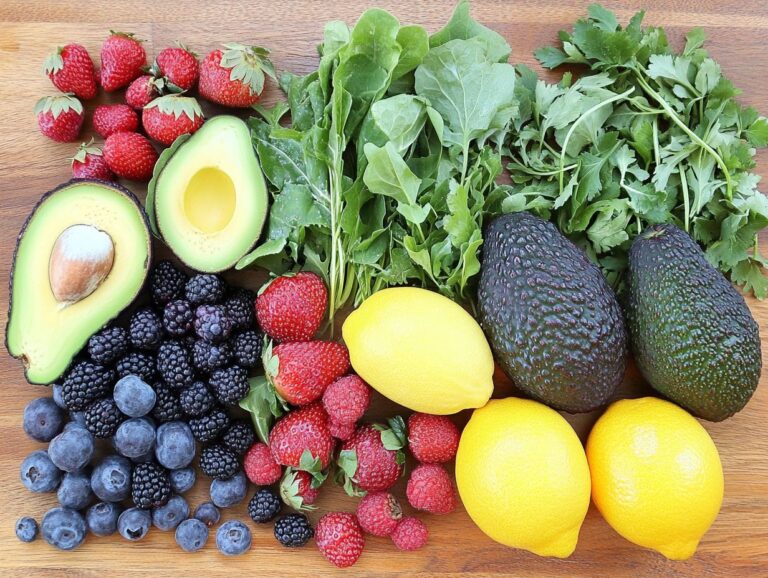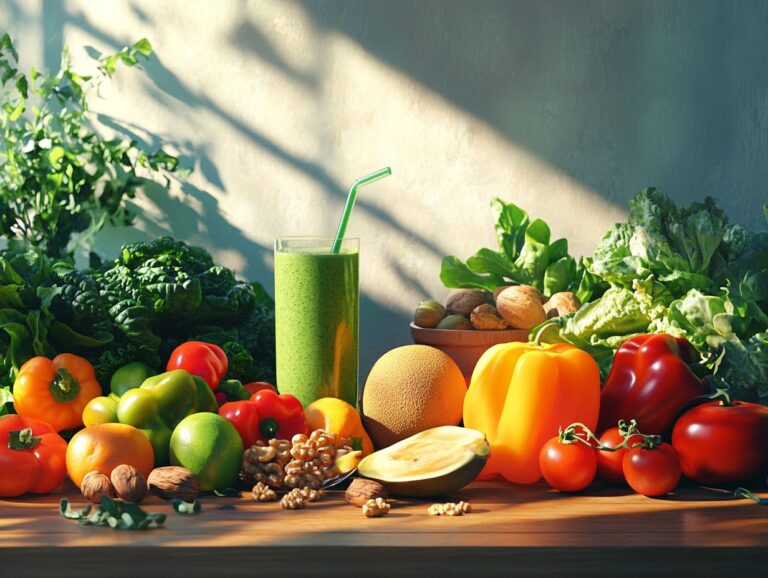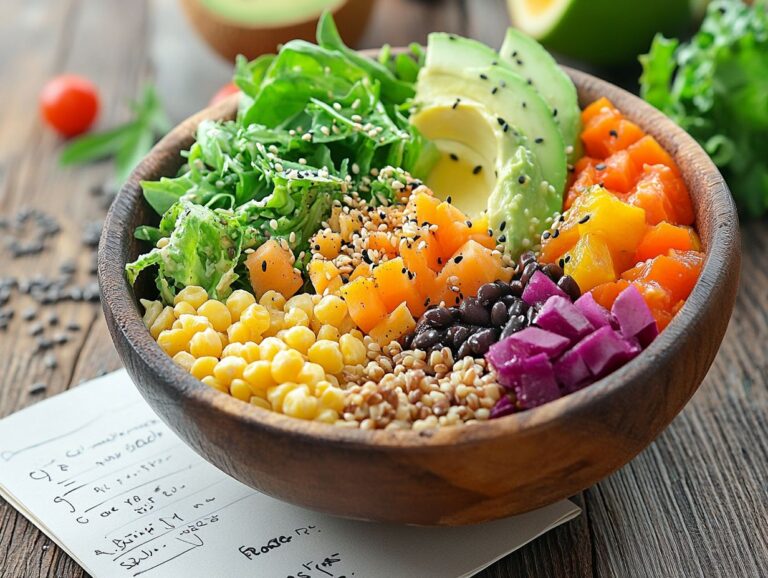Building muscle on a vegan diet is achievable with the right training and education. This comprehensive guide covers the fundamentals of a vegan diet, essential nutrients for muscle growth, and effective workouts tailored for vegans. It also provides meal planning tips, information on supplements, and highlights common mistakes to avoid, ensuring that you stay on track to meet your goals, whether you are an experienced athlete or just starting your fitness journey.
Key Takeaways:
- Vegan diets can provide all the necessary nutrients for muscle growth, but careful planning is crucial.
- Adequate protein, carbohydrates, and healthy fats are essential for building muscle on a vegan diet.
- Consistency, proper exercise selection, and proper supplementation are key for successful muscle building on a vegan diet.
The Basics of Gaining Muscle on a Vegan Diet
Gaining muscle on a vegan diet is a complex topic that involves understanding the nutritional requirements for adequate protein intake, effective training methods, and strategies specifically tailored for bodybuilders and those interested in lean muscle gain while following a vegan lifestyle. As more athletes, including Arnold Schwarzenegger, promote vegan diets, it becomes essential to explore how to maximize muscle mass while maintaining a balanced intake of the essential nutrients and dietary macronutrients necessary for muscle strength and overall nutritional fitness.
What is a Vegan Diet?
A vegan diet is a plant-based eating plan that excludes all animal products and emphasizes a variety of plant-based foods, including fruits, vegetables, legumes, nuts, and seeds. This diet provides essential nutrients, supports protein needs, and promotes good health. Additionally, a vegan diet supports ethical and environmental causes while serving as a rich source of vitamins, minerals, and antioxidants necessary for the optimal functioning of the body. Incorporating healthy fats from sources such as avocados, chia seeds, and olive oil can enhance the absorption of fat-soluble vitamins and are vital for hormone production. A well-planned vegan diet can also support individuals looking to build muscle and achieve fitness goals by providing adequate protein through foods like quinoa, lentils, and various plant-based protein sources. This ensures that individuals can thrive physically while adhering to a compassionate and health-conscious lifestyle.
How Can You Build Muscle on a Vegan Diet?
Building muscle on a vegan diet involves consuming enough protein from high-quality sources and maintaining a caloric surplus to support progressive overload during workouts. Optimal muscle gains can be achieved by vegetarians and vegans who include foods such as soy products (like tofu and tempeh) and legumes (such as peas and lentils) in their diets. These foods are rich in protein and contain essential amino acids that are crucial for muscle growth and repair. Eating a variety of whole food sources ensures an appropriate balance of macronutrients necessary for caloric energy. To stimulate muscle adaptations, it is essential to practice progressive overload during training, which involves gradually increasing the weight or resistance used in workouts. Therefore, individuals following a vegan diet should incorporate these protein-rich foods into their daily meals to reap their long-term benefits.
Understanding Nutrition for Muscle Growth
Proper nutrition is essential for muscle growth for anyone looking to improve their physique. For vegans, it is particularly important to ensure they consume a sufficient volume of foods to collectively meet all essential nutrient needs. This includes macronutrients such as protein, carbohydrates, and healthy fats, which work together to promote optimal muscle growth and overall health.
What Nutrients are Essential for Muscle Growth?
Essential nutrients for muscle growth include an adequate supply of protein, which is crucial for protein synthesis and muscle repair, as well as carbohydrates that provide the necessary energy for workouts and healthy fats that support hormonal balance and overall health. Protein sources such as lean meats, fish, eggs, and plant-based options like lentils and quinoa are vital for building and repairing muscle tissue. Carbohydrates not only replenish glycogen stores for sustained energy but also enhance recovery and help prevent muscle breakdown. Foods rich in complex carbohydrates, including whole grains, fruits, and vegetables, play a significant role in fueling workouts. Healthy fats from sources like avocados, nuts, and olive oil are equally important; they aid in nutrient absorption and support the production of key hormones that facilitate muscle growth. A balanced intake of these nutrients creates a strong foundation for achieving optimal fitness results.
How Can You Get Enough Protein on a Vegan Diet?
To meet protein needs on a vegan diet, individuals should consume a wide variety of protein-rich foods, including legumes, soy products, and whole grains. They can also use protein shakes or powders as supplements to enhance their overall protein intake. Exploring various vegan meals and recipes can help keep meals interesting while contributing to protein consumption. For instance, incorporating dairy alternatives like almond or soy milk along with a variety of nuts and seeds can provide additional nutrients and help satisfy daily requirements. Eating complementary proteins, such as rice and beans together, is essential for ensuring a more complete amino acid profile, which is important for muscle repair and growth. It is advisable to monitor protein intake through meal planning or tracking apps to ensure that individuals consistently meet their protein goals. Furthermore, those transitioning to a plant-based diet may benefit from collaborating with professionals to design a meal plan that meets their specific protein requirements, ensuring their nutritional intake supports their fitness objectives.
What Are Some Good Sources of Carbohydrates for Muscle Building?
Good sources of carbohydrates for muscle building on a vegan diet include whole grains, fruits, vegetables, and legumes. These foods provide essential energy necessary for increasing workout intensity and supporting muscle recovery. Examples of healthy carbohydrate sources for muscle building on a vegan diet are:
- Quinoa
- Brown rice
- Sweet potatoes
These can significantly boost energy levels and are beneficial for anyone looking to maximize their training. These nutrient-dense foods are rich in complex carbohydrates and also offer vitamins and minerals that contribute to overall health. Fruits such as bananas and berries serve as quick energy sources, while legumes like lentils and chickpeas provide healthy carbohydrates along with a substantial amount of protein, promoting muscle repair and growth.
What Types of Fats Are Important for Muscle Growth?
Healthy fats play a crucial role in muscle growth for those following a vegan diet. They provide essential nutrients that help produce hormones, serve as energy reserves, and support overall health, ultimately aiding in optimal performance and recovery. Healthy fats are classified into monounsaturated, polyunsaturated, and saturated fats, each offering unique benefits.
- Monounsaturated fats, found in avocados, olives, nuts, and olive oil, help reduce inflammation and promote cardiovascular health, which is vital for muscle recovery.
- Polyunsaturated fats, particularly omega-3 fatty acids from sources like flaxseeds, chia seeds, walnuts, and hemp seeds, are important for reducing muscle soreness and enhancing recovery after exercise.
- Saturated fats should be consumed in moderation and can be sourced from healthy plant-based options such as coconut oil.
Including a variety of healthy fats in meals ensures a balanced diet for vegans and supports muscle growth while promoting overall health.
Vegan Workout Tips for Building Muscle
The best tips for building muscle on a vegan diet focus on workout strategies that incorporate progressive overload, adequate recovery, and the proper execution of exercises tailored to meet the specific nutritional needs of vegan athletes, including appropriate protein supplementation and understanding of dietary macronutrients.
What Types of Exercises Are Best for Building Muscle on a Vegan Diet?
The most effective exercises for building muscle on a vegan diet are strength training regimens that incorporate compound exercises. These exercises allow bodybuilders to maximize muscle engagement and growth potential by targeting multiple muscle groups simultaneously. Examples of compound exercises to maximize muscle strength and athletic performance include:
- Squats
- Deadlifts
- Bench presses
These exercises enhance the overall efficiency of workouts and help ensure that the desired level of muscle development and lean muscle growth is achieved and maintained during each session. Additionally, pull-ups and overhead presses are excellent compound exercises that build strength and improve functional fitness, both of which are essential for overall health and exercise performance. Athletes following a vegan diet who consume nutrient-dense foods rich in protein, such as legumes, lentils, and quinoa, will reap the greatest benefits from these workouts, as these foods provide the necessary nutrients for muscle recovery and protein synthesis. This comprehensive approach allows athletes to achieve their muscle-building and fitness nutrition goals while remaining true to their dietary principles.
How Often Should You Work Out to Build Muscle?
An ideal training schedule for building muscle should strike a balance between workout frequency and recovery, typically ranging from 3 to 5 days of strength training per week. This balance is essential to ensure that workouts maintain sufficient intensity to effectively promote muscle growth while allowing adequate time for muscles to recover and repair themselves. A well-planned vegan diet, focused on nutrient-dense foods and high protein sources such as legumes, tofu, and quinoa, is also important for supporting muscle development and understanding vegan nutrition. Several factors contribute to an effective training schedule, including the incorporation of various exercises that target different muscle groups. Additionally, integrating rest days or lighter physical activity into the training routine can enhance muscle recovery by allowing the body to replenish energy stores and prevent overtraining. This careful balance between exercise, recovery, and proper caloric intake is crucial for achieving optimal muscle-building results.
What Are Some Tips for Maximizing Muscle Growth on a Vegan Diet?
Maximizing muscle growth on a vegan diet involves ensuring adequate protein intake, maintaining a caloric surplus, and optimizing recovery through rest and nutrition. To effectively implement these strategies, consider the following guidelines:
- Eat plant foods rich in protein: Incorporate legumes (such as lentils and chickpeas), whole grains (like quinoa and oats), nuts, tofu, and plant-based meats regularly throughout the day.
- Engage in resistance training: Aim to train at least three to four times a week to promote muscle repair and growth, utilizing a variety of exercises to target different muscle groups.
- Optimize nutrient timing: Consume protein and carbohydrates after exercise to enhance recovery.
- Stay hydrated: Ensure adequate fluid intake to support overall health and performance.
- Prioritize sleep: Get enough rest to facilitate recovery and muscle growth.
By following these guidelines, individuals can effectively maximize muscle growth while adhering to a vegan diet.
Supplements for Vegan Muscle Building
Supplements play a crucial role in vegan muscle building by helping to fill dietary gaps and ensuring an adequate intake of essential nutrients such as protein, creatine, vitamins, and minerals that are vital for muscle growth and recovery. Supplementing appropriately is key to supporting skeletal muscle development and overall energy generation.
What Supplements Can Help Support Muscle Growth on a Vegan Diet?
Vegan athletes can support muscle growth through various supplements, including plant-based protein powders and creatine supplementation. These supplements can significantly enhance athletic performance and recovery by aiding protein absorption and optimizing protein structure. Branched-chain amino acids (BCAAs) are frequently utilized for muscle repair and growth, with a common dosage of 5 to 10 grams taken before or after workouts. Another effective option is beta-alanine, which helps delay fatigue during intense training; a daily dose of 2 to 5 grams is a suitable starting point. Omega-3 fatty acids are often included in diets for improved joint health, and algal oil provides these essential nutrients while also helping to reduce inflammation and enhance recovery. These supplements can be easily integrated into a vegan lifestyle, ensuring that athletes receive the necessary nutrients to support muscle growth.
How Can You Ensure You’re Getting Enough Vitamins and Minerals on a Vegan Diet?
To ensure adequate intake of vitamins and minerals on a vegan diet, individuals should focus on consuming a diverse range of whole foods and consider supplementation for nutrients that may be lacking, such as vitamin B12, iron, and omega-3 fatty acids. Incorporating a wide variety of fruits, vegetables, whole grains, legumes, nuts, and seeds can significantly enhance the nutrient profile of meals. These food groups provide essential vitamins and minerals that are critical for maintaining overall health and strong immune function. It is also important to pay attention to food combinations; for example, pairing foods rich in vitamin C with sources of iron can enhance iron absorption. Fortified foods, such as plant-based milk and breakfast cereals, can help bridge any nutritional gaps that may arise. Consulting with a healthcare provider can further assist in determining specific supplementation needs tailored to individual dietary habits.
Creating a Vegan Meal Plan for Muscle Building
A vegan muscle-building meal plan should consist of a diverse range of meals and require careful planning to ensure adequate protein, calories, and balanced macronutrients necessary for effective muscle growth and recovery.
What Are Some Sample Meal Plans for Building Muscle on a Vegan Diet?
Sample meal plans for building muscle on a vegan diet should include a variety of protein-rich foods, healthy fats, and complex carbohydrates consumption, tailored to meet the caloric and nutritional needs of individuals engaged in strength training. To effectively promote muscle growth, it is essential that meals incorporate lentils, chickpeas, and quinoa, as these foods provide important sources of protein. For instance, a quinoa salad with black beans, mixed greens, and tahini dressing can deliver 30 grams of protein per serving. Additionally, incorporating nuts such as almonds or walnuts can provide healthy fats, which aid in nutrient absorption and hormone production. A post-workout smoothie made with pea protein powder, banana, and spinach can further support recovery and muscle synthesis by promoting skeletal muscles’ repair. Each meal should emphasize variety and balance to ensure that nutritional profiles are well-rounded and can meet the increased demands of intense physical activity.
How Can You Customize Your Meal Plan for Your Specific Goals and Needs?
Customizing your meal plan to meet specific goals and needs within a vegan diet involves assessing your protein requirements, caloric intake, and personal preferences to create a dietary approach that aligns with your muscle-building objectives. This tailored method ensures that individuals can effectively support their fitness ambitions, whether they aim to gain muscle, lose weight, or enhance athletic performance. Drawing inspiration from resources like The Game Changers documentary and Arnold Schwarzenegger’s advocacy for plant-based nutrition can also be beneficial. By understanding the unique nutritional demands based on activity levels and body composition, it becomes easier to select foods that are rich in essential nutrients. Incorporating nutrient-dense options such as legumes, seeds, and whole grains can significantly help in meeting your protein and caloric goals. Additionally, including a variety of fruits and vegetables not only boosts overall health but also provides the necessary vitamins for recovery and growth. Taking these considerations into account allows for a more effective and enjoyable approach to any vegan meal plan.
Common Mistakes to Avoid When Building Muscle on a Vegan Diet
The most common mistakes that can hinder muscle growth on a vegan diet include insufficient protein intake, failure to maintain a caloric surplus, and not meeting essential nutrient requirements, all of which can lead to nutritional deficiencies.
What Are Some Common Pitfalls to Watch Out for?
Common mistakes made when attempting to build muscle on a vegan diet include underestimating protein needs, failing to maintain a caloric surplus, and not diversifying food sources to meet all essential nutrient requirements. It’s crucial to have a comprehensive nutritional understanding to avoid these pitfalls. When a vegan individual aims to gain muscle, it is important to note that plant-based proteins generally have different amino acid profiles. As a result, relying solely on grains or specific legumes may not provide sufficient protein, necessitating a combination of sources such as lentils, chickpeas, quinoa, and soy products. Maintaining a caloric surplus can be more challenging; therefore, it is essential to incorporate calorie-dense foods like nuts, seeds, and avocados into meals, which also adds healthy fats to the diet. Diversification is critical: using fortified plant milks and a wide variety of fruits and vegetables ensures adequate intake of vital nutrients such as B12, iron, and omega-3 fatty acids.
How Can You Avoid Nutritional Deficiencies on a Vegan Diet?
Preventing nutritional deficiencies on a vegan diet involves ensuring an adequate intake of vitamins, minerals, and protein through a diverse array of whole foods and, if necessary, supplements. This can be achieved by incorporating a wide variety of fruits, vegetables, legumes, nuts, and seeds, which offer benefits beyond their nutrient content. For example, including dark leafy greens can enhance iron and calcium intake, while legumes provide essential protein and fiber. Fortified foods can also help meet daily requirements for nutrients like vitamin B12 and vitamin D, which are often highlighted in vegan recipes. Careful meal planning and an awareness of individual dietary needs can further support nutritional adequacy, helping to maintain energy levels and promote long-term health.
What Are Some Tips for Staying Motivated and Consistent with Your Vegan Muscle Building Journey?
Maintaining motivation and consistency in a vegan muscle-building program hinges on setting clear goals, effective meal planning, and fostering a supportive community that reinforces both dietary and training commitments. Thoughtful strategies, including drawing motivation from influential figures like Arnold Schwarzenegger and films like Escape Plan, are essential to ensure motivation is sustained throughout this journey.
- Firstly, setting attainable yet challenging goals is crucial. Breaking larger objectives into smaller milestones can provide visible, incremental progress that helps keep motivation high.
- Secondly, proper meal planning is vital. Goals and preferences should align with nutritional requirements; for instance, if someone dislikes tofu, they should avoid it despite its reputation as a healthy plant-based protein source. Instead, they should focus on planning meals that incorporate plant-based protein sources they enjoy and experiment with different recipes.
- Lastly, finding a community is important. Engaging with others who share a similar journey can help reinforce motivation and consistency. Whether through online forums, local meet-ups, or social media groups, connecting with individuals on a similar path can alleviate the often solitary nature of muscle building.
